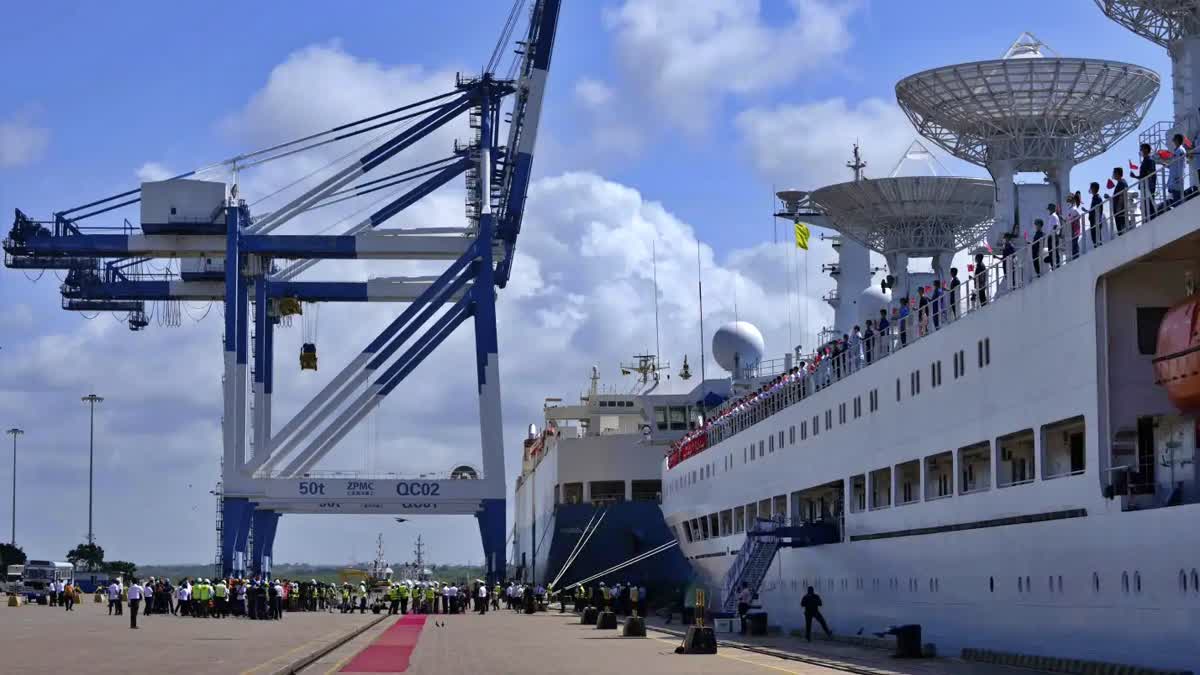New Delhi: In yet another manifestation of new President Mohamed Muizzu’s pro-China stance, the Maldives, after having terminated a hydrography agreement with India, has reportedly granted permission to a Chinese vessel to enter its territorial waters ostensibly to do research work.
This comes despite India red-flagging both the Maldives and Sri Lanka last month about the entry of the vessel Xiang Yang Hong 3 into the waters of the south Indian Ocean. While Sri Lanka took into consideration India’s concerns and put a one-year moratorium on the entry of all foreign research vessels, the Maldives has gone ahead and given permission to the vessel to enter its waters.
Chinese vessel Xiang Yang Hong 3- According to a report in the online newspaper Sri Lanka Guardian, Maldivian authorities have granted permission to the Chinese vessel Xiang Yang Hong 3 to dock in the Maldives at the end of this month. Citing reliable sources in the Ministry of Foreign Affairs in the Maldives, the report stated that there was no objection to mooring Chinese ships in the waters of the Indian Ocean archipelago nation. This decision comes despite pressure from the Indian government and concerns raised by various quarters about the vessel being a “spy vessel”. The vessel was earlier scheduled to start conducting “deep water exploration” in Sri Lankan waters from the beginning of this month.
“President Dr. Mohamed Muizzu, who assumed office recently, reportedly decided to grant permission for the Chinese research vessel, dismissing allegations that it could be involved in espionage activities,” the Sri Lanka Guardian report stated.
Muizzu's state visit to China- This development comes even as the President’s Office announced on Thursday that Muizzu will be making a state visit to China from January 7 to 12. This is a break from the practice followed by his three immediate predecessors – Ibrahim Solih, Abdulla Yameen amd Mohamed Nasheed – who had made India the destination of their first state visit after assuming office. In fact, Muizzu chose Turkey as the destination of his first state visit after assuming office in November last year.
India's concern- The decision to grant entry to the Chinese vessel will also be a matter of concern for India as this comes after Male decided not to renew a hydrography agreement with New Delhi citing national security concerns and the safeguarding of sensitive information. The hydrographic survey agreement was signed on June 8, 2019, during Prime Minister Narendra Modi’s visit to the Maldives. Under the agreement, India was allowed to conduct a comprehensive study of the island nation’s territorial waters, which includes reefs, lagoons, coastlines, ocean currents, and tide levels.
India's policy- As part of New Delhi’s Neighbourhood First Policy, the Maldives is strategically significant to India because of its location in the Indian Ocean. India and the Maldives share ethnic, linguistic, cultural, religious and commercial links steeped in antiquity and enjoy close, cordial and multi-dimensional relations. However, regime instability in the Maldives since 2008 has posed significant challenges to the India-Maldives relationship, particularly in the political and strategic spheres.
India's Indo-Pacific security role- Although India continues to be an important partner of the Maldives, New Delhi cannot afford to be complacent over its position and must remain attentive to the developments in the Maldives. India must play a key role within the Indo-Pacific security space to ensure regional security in South Asia and surrounding maritime boundaries. China’s strategic footprint in India’s neighbourhood has increased. The Maldives has emerged as an important ‘pearl’ in China’s ‘String of Pearls’ construct in South Asia.
It is worth mentioning here that India has strongly been protesting the repeated visits by Chinese vessels to the waters of the south Indian Ocean, a region New Delhi considers to be under its sphere of influence, ostensibly for research purposes.
Sri Lanka's date with Chinese vessels- In October last year, Sri Lanka’s foreign ministry granted permission for the Chinese research vessel Shi Yan 6 to engage in supervised marine research along its west coast for a two-day period. The vessel, initially docked in Colombo for “replenishments” amid apprehensions of potential espionage, was authorised for research activities under close monitoring. This decision was in response to India’s security concerns related to China’s growing presence in the Indian Ocean and its strategic influence in Sri Lanka.
What US said? The US too had voiced concerns about the visit of the Shi Yan 6 to Sri Lanka. During a meeting with Sabry on the sidelines of the UN General Assembly Session in New York in September last year, US Undersecretary for Political Affairs Victoria Nuland had raised this matter.
QUAD effect- Sri Lanka was under pressure from Japan too on this issue. India, the US and Japan, along with Australia, are part of a Quad that is working for a free and open Indo-Pacific in the face of Chinese hegemony in the region that stretches from the east coast of Japan to the east coast of Africa.
Coming to the Xiang Yang Hong 3, though Sri Lanka paid heed to India’s concerns and stopped the vessel from entering its waters, the Maldives has decided to do exactly the opposite.
Read More
- Despite anticipated setbacks, why India-Maldives cooperation may stay on track
- Indian troops' withdrawal: Is Maldives President Muizzu in a fix?
- India is cooperating with many countries in IOR on hydrography: MEA on Maldives not renewing pact
- Maldives decides not to renew Hydrographic Survey agreement with India



